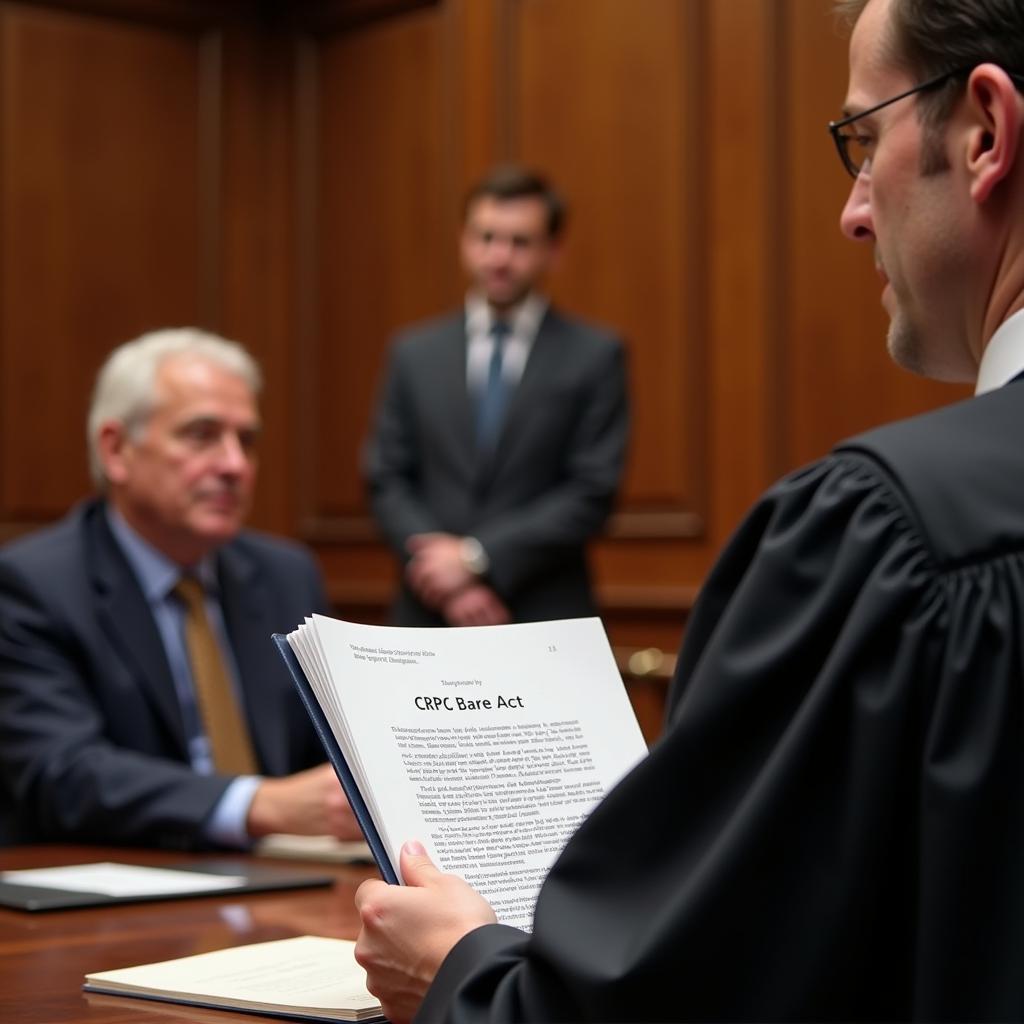The Criminal Procedure Code (CRPC) Bare Act in Pakistan is the cornerstone of criminal law administration. This comprehensive legal document dictates the procedures followed by law enforcement and the judiciary, from the initial investigation to the final judgment. Understanding its provisions is crucial for anyone involved in or affected by the criminal justice system in Pakistan.
Navigating the Complexities of the CRPC Bare Act Pakistan
The CRPC Bare Act, as its name suggests, presents the law in its raw form, without interpretations or commentary. This can make it challenging to navigate, especially for those unfamiliar with legal jargon. However, its importance cannot be overstated. It serves as the foundational document that outlines the powers and limitations of law enforcement agencies, protects the rights of the accused, and ensures a fair and transparent judicial process.
Key Provisions of the CRPC Bare Act
The CRPC covers a wide range of procedures, including:
- Arrest and Detention: The Act lays out the conditions under which an individual can be arrested, the procedures to be followed during arrest, and the rights of the detainee. These regulations are vital in preventing arbitrary arrests and ensuring due process.
- Search and Seizure: The CRPC defines the circumstances under which searches can be conducted and the procedures that must be followed. This helps protect individuals from unwarranted intrusions into their privacy.
- Bail and Bonds: The Act outlines the provisions for granting bail, including the criteria for eligibility and the conditions that may be imposed.
- Trial Procedures: The CRPC details the process of criminal trials, from the filing of charges to the presentation of evidence and the pronouncement of judgment.
- Appeals and Revisions: The Act provides for mechanisms to challenge convictions and sentences, ensuring that individuals have the right to appeal to higher courts.
The CRPC also addresses specific offenses and their corresponding procedures, such as those related to juveniles, women, and foreigners. This comprehensive approach ensures that the law caters to the specific needs and vulnerabilities of different groups within society.
Why is Understanding the CRPC Bare Act Important?
Knowledge of the CRPC empowers citizens to understand their rights and responsibilities within the criminal justice system. It allows them to navigate legal proceedings effectively, protect themselves from potential abuses of power, and ensure that justice is served.
Common Questions about the CRPC Bare Act in Pakistan
What are the rights of an accused person under the CRPC? The CRPC guarantees several fundamental rights to the accused, including the right to remain silent, the right to legal representation, and the right to a fair trial.
How can I obtain a copy of the CRPC Bare Act? The Act is publicly available and can be accessed online through various legal databases and government websites. Physical copies can also be purchased from legal bookstores.
 CRPC Bare Act in Action: A Courtroom Scene
CRPC Bare Act in Action: A Courtroom Scene
Can the CRPC be amended? Yes, the CRPC can be amended by the Parliament of Pakistan through the legislative process. Amendments are made periodically to address evolving societal needs and to ensure that the law remains relevant and effective.
CRPC and the Digital Age
The rise of technology has brought new challenges to the application of the CRPC. Issues such as cybercrime and digital evidence require careful consideration and adaptation of existing legal frameworks. The ongoing development of legal precedents and interpretations is crucial in ensuring that the CRPC remains effective in the digital age.
Expert Insights on the CRPC
Barrister Ayesha Khan, a renowned criminal law expert in Lahore, emphasizes the importance of continuous learning: “The CRPC is a dynamic document. Staying updated with amendments and judicial interpretations is essential for anyone involved in legal practice.”
Mr. Imran Ali, a Senior Advocate at the Supreme Court of Pakistan, adds: “The CRPC serves as a vital safeguard against injustice. Understanding its provisions is not just for legal professionals, but for every citizen.”
In conclusion, the CRPC Bare Act in Pakistan is a fundamental pillar of the criminal justice system. Understanding its intricacies is crucial for ensuring fair and transparent legal proceedings. While the Act can be complex, resources are available to help individuals navigate its provisions and protect their rights. By promoting awareness and understanding of the CRPC, we can contribute to a more just and equitable society.
FAQ:
-
What is the purpose of the CRPC? The CRPC governs the procedures for criminal investigations, trials, and appeals in Pakistan.
-
Who can be arrested under the CRPC? Anyone suspected of committing a cognizable offense can be arrested under the CRPC.
-
What are the different types of bail under the CRPC? The CRPC outlines several types of bail, including regular bail, anticipatory bail, and interim bail.
-
How can I file a complaint under the CRPC? Complaints can be filed at the nearest police station or magistrate court.
-
What is the role of a magistrate under the CRPC? Magistrates play a crucial role in overseeing criminal proceedings, from issuing warrants to conducting trials.
-
What is the difference between cognizable and non-cognizable offenses? Cognizable offenses allow police to arrest without a warrant, while non-cognizable offenses require a warrant.
-
What are the remedies available under the CRPC if my rights are violated? The CRPC provides various remedies, including filing applications for bail, discharge, and quashing of proceedings.
Need assistance with the CRPC Bare Act in Pakistan? Contact us at Phone: +923337849799, Email: [email protected] or visit our office at Dera Ghazi Khan Rd, Rakhni, Barkhan, Balochistan, Pakistan. Our customer service team is available 24/7. Explore other related articles and resources on our website for more information on Pakistani law.